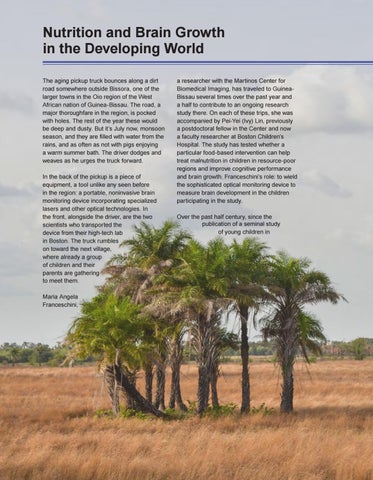Nutrition and Brain Growth in the Developing World The aging pickup truck bounces along a dirt road somewhere outside Bissora, one of the larger towns in the Oio region of the West African nation of Guinea-Bissau. The road, a major thoroughfare in the region, is pocked with holes. The rest of the year these would be deep and dusty. But it’s July now, monsoon season, and they are filled with water from the rains, and as often as not with pigs enjoying a warm summer bath. The driver dodges and weaves as he urges the truck forward. In the back of the pickup is a piece of equipment, a tool unlike any seen before in the region: a portable, noninvasive brain monitoring device incorporating specialized lasers and other optical technologies. In the front, alongside the driver, are the two scientists who transported the device from their high-tech lab in Boston. The truck rumbles on toward the next village, where already a group of children and their parents are gathering to meet them. Maria Angela Franceschini,
86
a researcher with the Martinos Center for Biomedical Imaging, has traveled to GuineaBissau several times over the past year and a half to contribute to an ongoing research study there. On each of these trips, she was accompanied by Pei-Yei (Ivy) Lin, previously a postdoctoral fellow in the Center and now a faculty researcher at Boston Children’s Hospital. The study has tested whether a particular food-based intervention can help treat malnutrition in children in resource-poor regions and improve cognitive performance and brain growth. Franceschini’s role: to wield the sophisticated optical monitoring device to measure brain development in the children participating in the study. Over the past half century, since the publication of a seminal study of young children in
